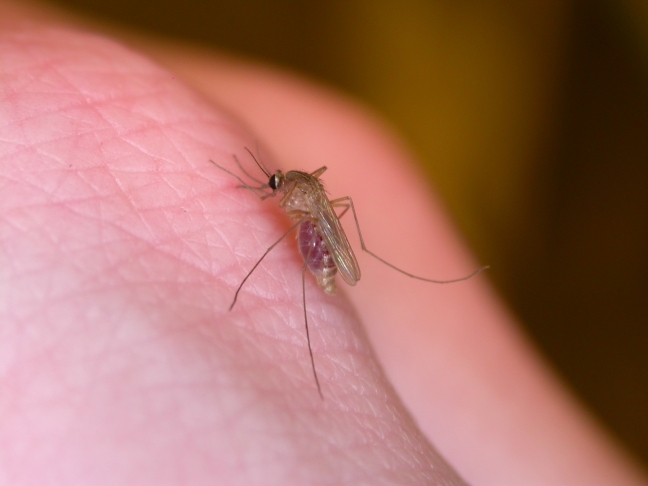
Iowans may start to notice more mosquitoes in the weeks ahead as the summer months bring warmer and wetter conditions. Larger image.
AMES, Iowa – Mosquitoes, though few in number at the moment, are just waiting for warm and wet summer weather to begin ramping up their numbers, according to an Iowa State University entomologist.
The beginning of June often marks the unofficial start to mosquito season in Iowa, with clouds of adult bugs invading ball games, barbecues and other outdoor activities in the wake of major rainfall and rising temperatures, said Brendan Dunphy, an entomology research associate who currently manages the ISU Medical Entomology Laboratory.
“Anywhere between June and August we can see peak mosquito activity,” Dunphy said. “We may even see multiple distinct peaks throughout the summer because the populations can subside just as quickly as they grow.”
The Medical Entomology Laboratory catalogs mosquitoes collected by traps across the state, and the good news is that mosquito activity has remained fairly quiet in 2015, according to the data.
But that can change in a hurry, Dunphy said.
“Mosquito populations are very dynamic,” he said. “They can grow very quickly and crash very quickly.”
The most common mosquitoes Iowans have to deal with during the summer are sometimes referred to as “floodwater mosquitoes.” The name comes from their ability to lay eggs on dry land that may lie dormant for weeks or months until the right amount of precipitation is present. After significant rainfall or flooding, development inside the eggs reactivates, and the eggs quickly hatch. About a week and a half later, adult mosquitoes emerge and start marauding for blood.
Aedes vexans, the most common pest mosquito species, exhibits floodwater tendencies, Dunphy said.
The mosquitoes that most commonly carry viruses, such as Culex pipiens, lay eggs on standing water and usually don’t appear until later in the summer, he said.
Dunphy recommended that Iowans who want to avoid mosquitoes rid their lawns of all standing water to cut down on the available habitat. He said flower pots, gutters and bird baths all have the potential to attract mosquitoes. Mosquito repellants provide some protection as well as staying indoors around dusk, when mosquito activity is often the heaviest, he said.